北师大版(2019)必修第二册Unit 5 Humans and nature Lesson 3 Race to the pole 课件(共45张PPT)
文档属性
| 名称 | 北师大版(2019)必修第二册Unit 5 Humans and nature Lesson 3 Race to the pole 课件(共45张PPT) |
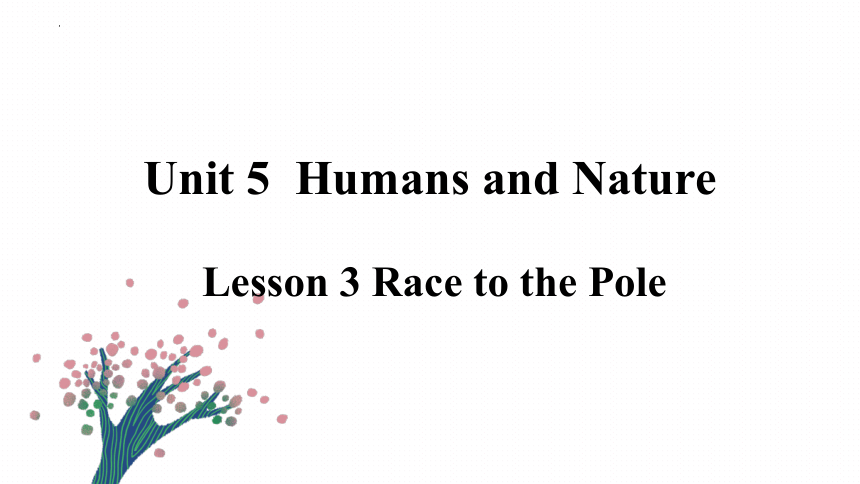
|
|
| 格式 | pptx | ||
| 文件大小 | 12.5MB | ||
| 资源类型 | 教案 | ||
| 版本资源 | 北师大版(2019) | ||
| 科目 | 英语 | ||
| 更新时间 | 2024-02-26 00:00:00 | ||
图片预览

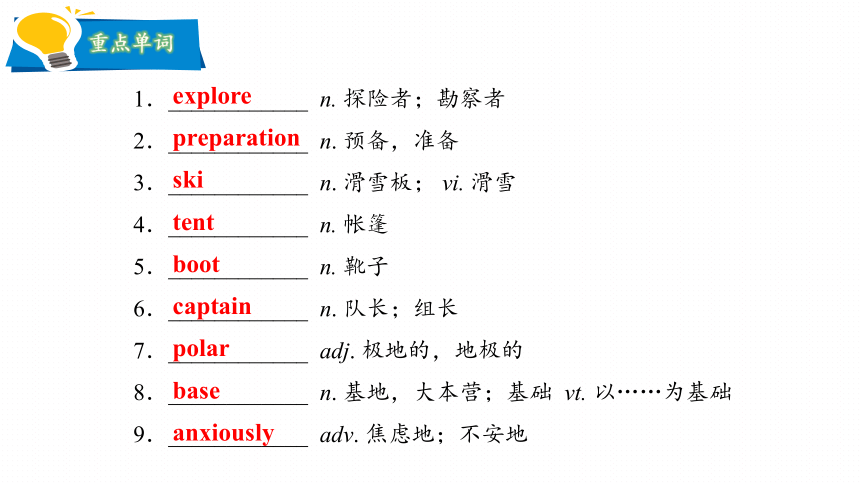
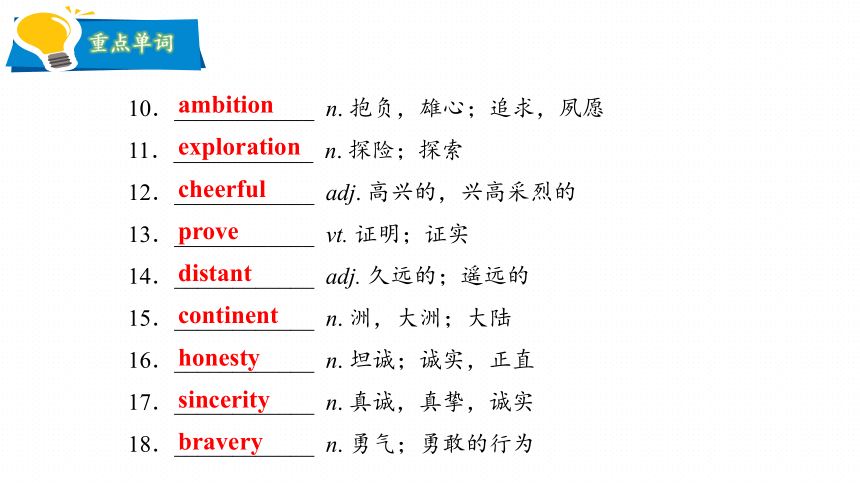
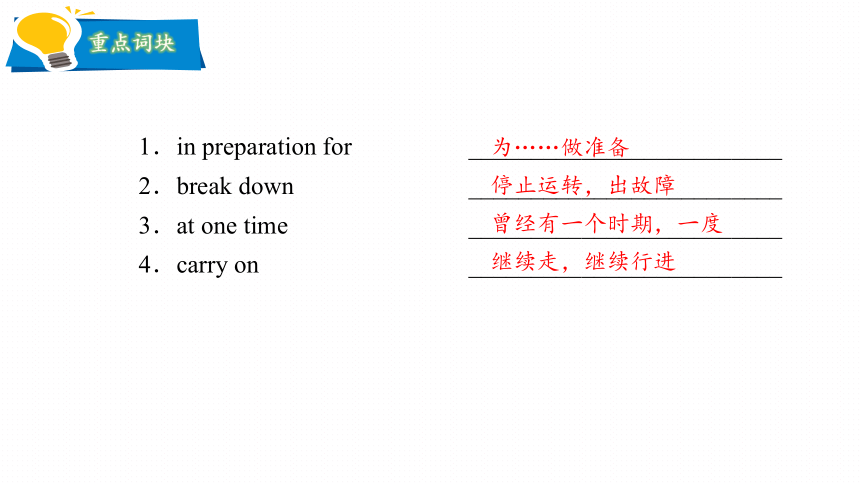
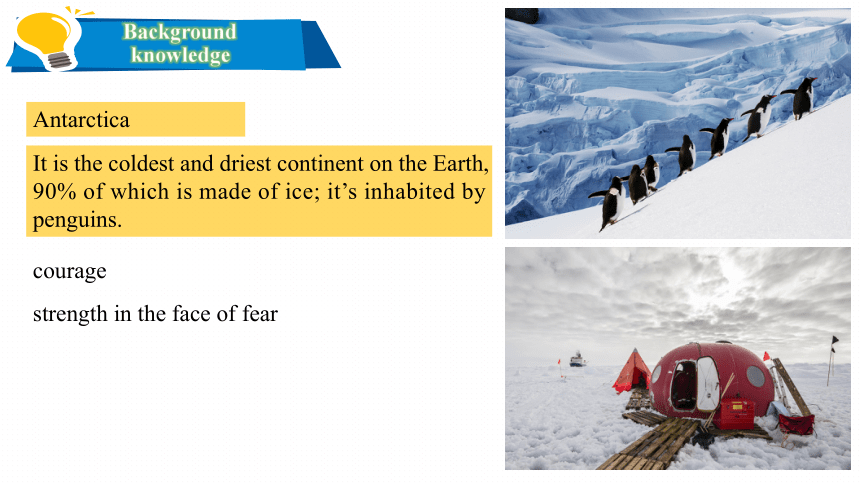

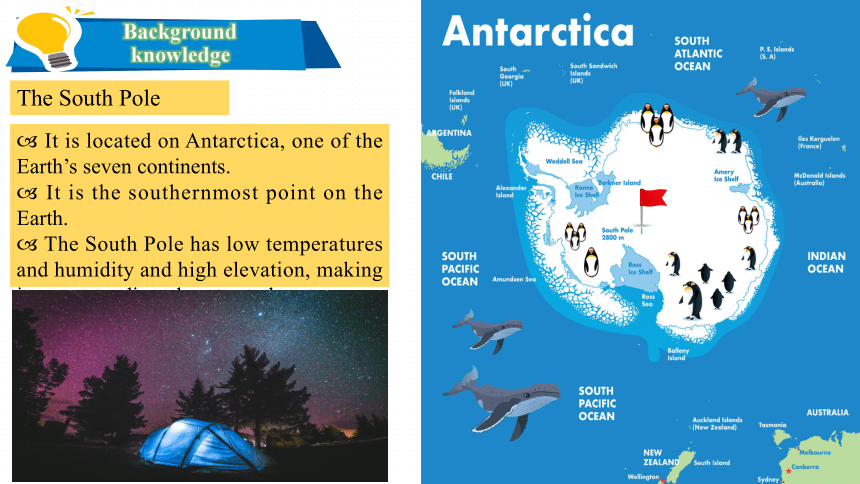
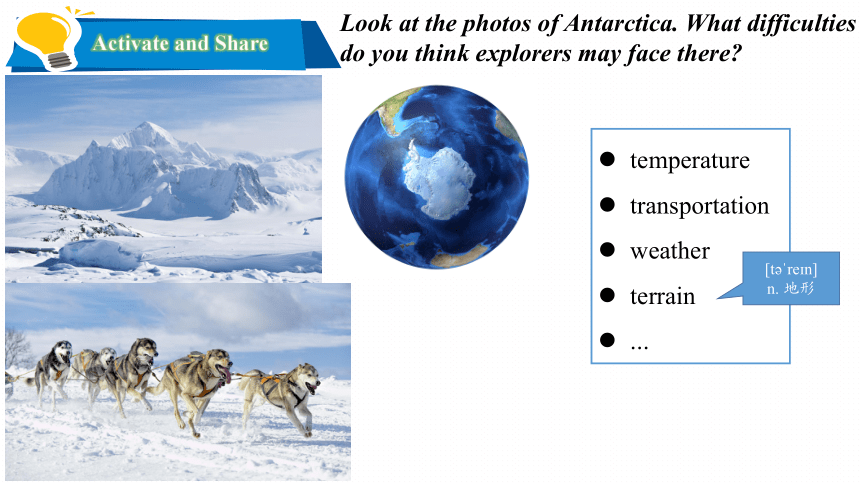
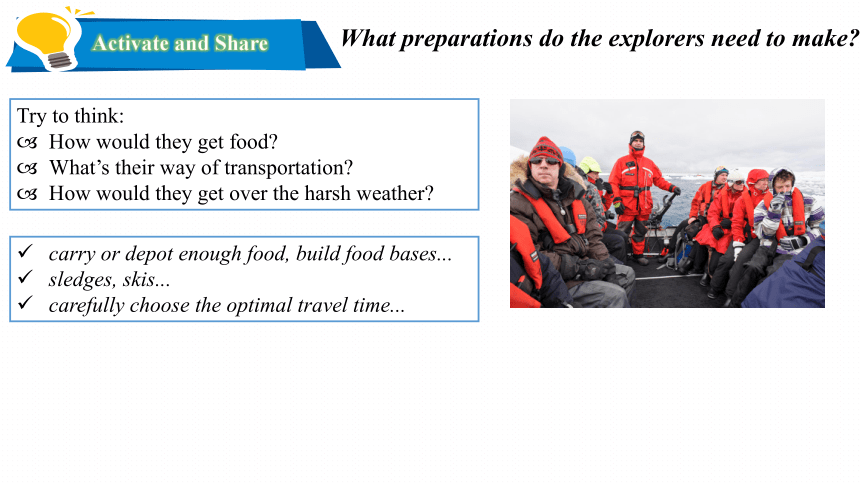
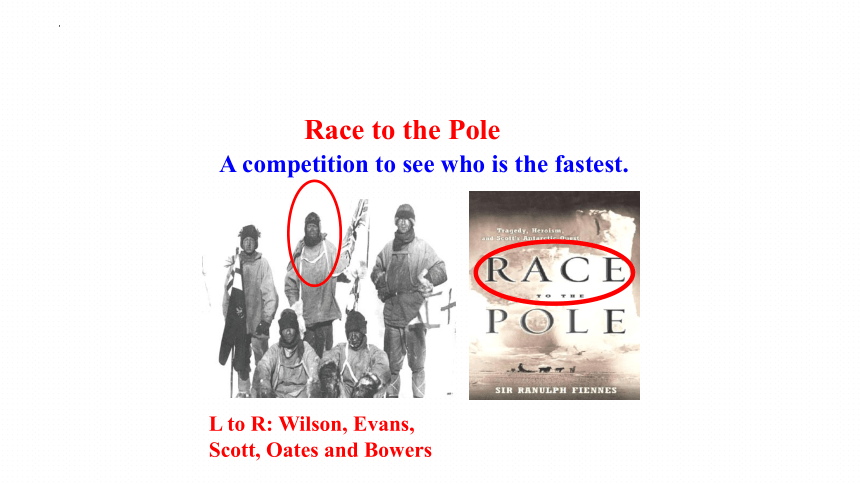
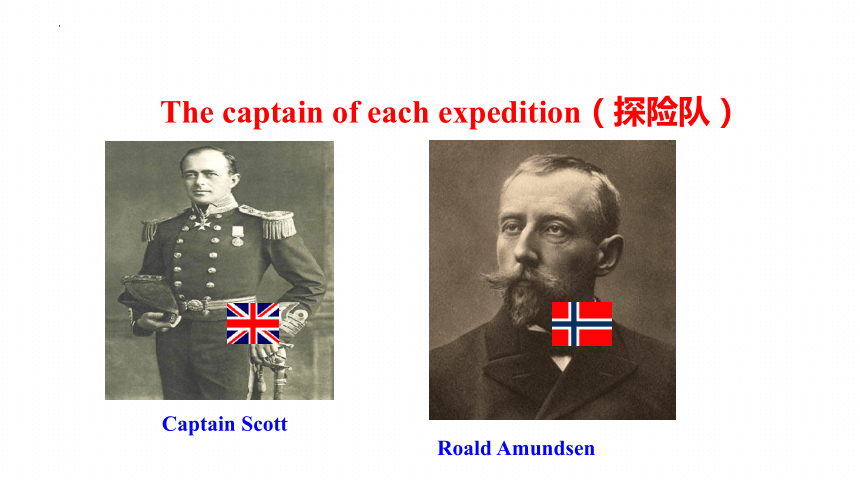
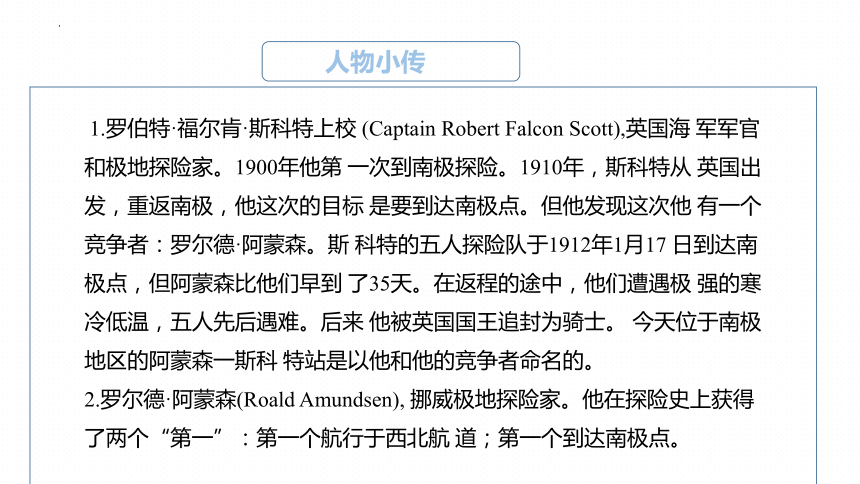
文档简介
(共45张PPT)
Unit 5 Humans and Nature
Lesson 3 Race to the Pole
重点单词
1.____________ n. 探险者;勘察者
2.____________ n. 预备,准备
3.____________ n. 滑雪板; vi. 滑雪
4.____________ n. 帐篷
5.____________ n. 靴子
6.____________ n. 队长;组长
7.____________ adj. 极地的,地极的
8.____________ n. 基地,大本营;基础 vt. 以……为基础
9.____________ adv. 焦虑地;不安地
explore
preparation
ski
tent
boot
captain
polar
base
anxiously
重点单词
10.____________ n. 抱负,雄心;追求,夙愿
11.____________ n. 探险;探索
12.____________ adj. 高兴的,兴高采烈的
13.____________ vt. 证明;证实
14.____________ adj. 久远的;遥远的
15.____________ n. 洲,大洲;大陆
16.____________ n. 坦诚;诚实,正直
17.____________ n. 真诚,真挚,诚实
18.____________ n. 勇气;勇敢的行为
ambition
exploration
cheerful
prove
distant
continent
honesty
sincerity
bravery
重点词块
1.in preparation for _________________________
2.break down _________________________
3.at one time _________________________
4.carry on _________________________
为……做准备
停止运转,出故障
曾经有一个时期,一度
继续走,继续行进
Background knowledge
Antarctica
It is the coldest and driest continent on the Earth, 90% of which is made of ice; it’s inhabited by penguins.
courage
strength in the face of fear
南极洲是围绕南极的大陆,地球七大洲之一。南极大陆几乎全被冰川覆盖。整个大陆只有少数地方无长年冰雪覆盖,动 植物能够生存。全境为平均海拔2350米的大高原,是世界上平均海拔最高的洲。 南极洲每年分寒、暖两季,4月一10月是寒季,11月—3月是暖季。在南极圈内暖季有极昼现象,寒季则有极夜现象,并 有绚丽的极光出现在南极圈附近。南极洲蕴藏的矿物有22余种,生活的动物有企鹅、海象、海狮、信天翁等。
背景小贴士
Background knowledge
The South Pole
It is located on Antarctica, one of the Earth’s seven continents.
It is the southernmost point on the Earth.
The South Pole has low temperatures and humidity and high elevation, making it an outstanding place to study astronomy.
Look at the photos of Antarctica. What difficulties do you think explorers may face there
Activate and Share
temperature
transportation
weather
terrain
...
[t re n]
n. 地形
What preparations do the explorers need to make
Activate and Share
Try to think:
How would they get food
What’s their way of transportation
How would they get over the harsh weather
carry or depot enough food, build food bases...
sledges, skis...
carefully choose the optimal travel time...
A competition to see who is the fastest.
Race to the Pole
L to R: Wilson, Evans,
Scott, Oates and Bowers
The captain of each expedition(探险队)
Captain Scott
Roald Amundsen
1.罗伯特·福尔肯·斯科特上校 (Captain Robert Falcon Scott),英国海 军军官和极地探险家。1900年他第 一次到南极探险。1910年,斯科特从 英国出发,重返南极,他这次的目标 是要到达南极点。但他发现这次他 有一个竞争者:罗尔德·阿蒙森。斯 科特的五人探险队于1912年1月17 日到达南极点,但阿蒙森比他们早到 了35天。在返程的途中,他们遭遇极 强的寒冷低温,五人先后遇难。后来 他被英国国王追封为骑士。 今天位于南极地区的阿蒙森一斯科 特站是以他和他的竞争者命名的。
2.罗尔德·阿蒙森(Roald Amundsen), 挪威极地探险家。他在探险史上获得 了两个“第一”:第一个航行于西北航 道;第一个到达南极点。
人物小传
Read and explore
On 1 June, 1910, Captain Robert Falcon Scott left London to begin his journey to Antarctica. While he was on the way to Antarctica, he received a message from the Norwegian explorer Roald Amundsen which said he was going south, too. Then the race to the South Pole began!
on用在具体某天前
旅行
journey: 长途旅行,或到国外或远方旅行。
travel: 泛指旅行的行为,而不特指某次具体的旅行。
tour: 往返旅行,可长可短。
voyage: 航海、航空旅行
trip: 短距离旅行。
从……收到一条消息
南极
Read and explore
During the polar summer of 1910一1911, both teams organised food bases in preparation for their journeys the next year. Then came the total darkness of the polar winter. Scott and Amundsen waited anxiously for spring.
polar adj. 极地的
polar day 极昼
polar night 极夜
food bases 食品基地
base n. 基地、基础
v. 以……为基础
为……准备
the next year: 是以过去的或未来的某个时间点作为时间计算的起点,从那个时间点算起的明年。
wait for 等待
adv. 焦急地,修饰动词,做状语
倒装句,主语为the total darkness of the polar winter
Read and explore
Amundsen was the first to leave on 8 September, 1911. He had teams of dogs pulling the sledges and all his men were on skis. Because of this, he made rapid progress. Scott left on 1 November and soon had problems. First, his two sledges broke down and then the horses began to have serious difficulties with the snow and the cold. After a while, Scott and his men had to push the sledges themselves.
because of 由于
=due to
=on account of
=thanks to
=owing to
=as a result of
快速发展
有困难
抛锚
have difficulties/ troubles with sth.
= have difficulties/ troubles in doing sth. 做某事有困难
过了一会儿
Read and explore
Amundsen reached the Pole on 14 December, 1911 and put a Norwegian flag there. Then he prepared for the return journey. Amundsen and his team arrived safely back to their starting base on 25 January, 1912, ten days ahead of their planned schedule.
reach v.到达
reach after 努力谋求
reach back回顾
reach for 伸手去抓
reach out 伸手拿;追求
准备
arrive 达到
arrive in 到达大地点
arrive at 到达小地点
在……前面;早于
计划表
Scott finally arrived at the Pole with four team members on 17 January, 1912. They were shocked when they saw the Norwegian flag.
Scott wrote in his diary:
"Well, we have now lost the goal of our ambition and must face 800 miles of hard pushing一 and goodbye to most of our dreams."
Read and explore
finally 最终,最后
=at last
=eventually
=at length
震惊的(修饰人)
in one’s story 在某人的日记中
v. 面对
face difficulties 面对困难
goodbye to 向……再见
The return journey was one of the worst in the history of exploration. The men were soon very tired and were running out of food. The weather conditions were terrible. Scott started to realise their hopeless situation:
Read and explore
归途
……中最坏的一个
(最高级)
run out of 用完;用光,主语为人;
run out 用光;用完,主语为时间、金钱、食物等无生命名词。
weather condition
天气条件
hope + less
否定后缀
=没有希望的
“We are very cheerful, but what each man feels in his heart I can only guess. Putting on our shoes in the morning is getting slower and slower."
Read and explore
cheer + ful
形容词后缀
=高兴的,愉悦的
what each man feels in his heart为guess的宾语,为了强调被放到了主语之前
越来越慢
However, on their way back they found time to look for rocks. They carried
twenty kilos of rocks all the way with them. Later, these rocks proved that at one
time in the distant past, the continent of Antarctica was covered by plants.
Read and explore
However 然而,副词
在他们回去的路上
look for寻找
look about/ round 环顾四周
look back on 回顾
look down on sb./ sth. 看不起
一路上
曾经,一度
at a time 一次
at no time 决不
被覆盖
Then disaster came. Edgar Evans had a terrible disease and died after a bad fall. The next to go was Captain Oates, who was having great difficulty
walking. Scott recorded his death:
Read and explore
die after+死前发生的事件
die from+原因
die in+地点
die of+疾病名字
death n. 死亡
die v. 死
dead adj. 死了的
dying adj. 奄奄一息的
"He said, I am just going outside and may be some time. ...We knew that poor Oates was walking to his death, but though we tried to stop him, we knew that it was the act of a brave man and an English gentleman. We all hope to meet the end with a similar spirit, and certainly the end is not far."
Read and explore
go outside 出去
尽管,引导让步状语从句
though
=although
=even though
=even if
Scott and two of his team members carried on and got within eleven miles of one of their food bases. But then a terrible storm started and they could not leave their tent. Scott spent some of his last hours writing. He wrote a letter full of sadness to his wife Kathleen:
Read and explore
继续,坚持,开展
spend ...(in) doing sth.
花时间做……
"I could tell you lots and lots about this journey. What stories you would have for the boy ... but what a price to pay."
Scott's diary also told the story of their end:
"We are getting weaker and weaker and the end can't be far. It seems a pity, but I do not think I can write more."
Read and explore
“关于这次旅行我有太多太多的事情想告诉你。很多你愿意给孩子讲的故事……但付出了多大的代价啊。”
看似
The news of Scott's death shocked the
world. Even Amundsen was moved by
Scott's death saying "Captain Scott left a record, for honesty, sincerity, for bravery, for everything that makes a man". Scott had failed to win the race to the Pole, but the great courage shown by Scott and his men made them heroes.
be moved by 被感动
fail to do sth. 失败做某事
Read and explore
3. Read again and complete the information about the two teams and make comparisons.
Scott's team Amundsen's team
Nationality of the two teams
Before the journey
Journey to the destination
Arrival at the destination
The return journey
Read again. Complete the information about the two exploration teams.
Read and Explore
Scott’s team Amundsen’s team
Nationality of the two teams
Before the journey
Journey to the destination
British
Norwegian
They organised food bases.
They organised food bases.
Two sledges broke down. The horses had difficulties with the cold. Scott and his men had to push the sledges themselves.
He had teams of dogs pulling the sledges and all his men were on skis. Because of this, he made rapid progress.
Scott’s team Amundsen’s team
Arrival at the destination
The return journey
Scott arrived at the Pole with four team members on 17 January, 1912 and was disheartened.
Amundsen reached the Pole on 14 December, 1911 and put a Norwegian flag there. Then he prepared for the return journey.
Men were very tired and were running out of food.
The weather conditions were terrible.
They brought rocks back for scientific evaluation. All members died.
Amundsen and his team arrived safely back to their starting base on 25 January, 1912, ten days ahead of their planned schedule.
Read the underlined sentences from Scott’s diary and letter. Work out the implied meaning of the sentences.
Read and Explore
Sometimes things are not stated directly in the text. To understand what is meant, we need to read between the lines. This is called “making inferences”.
Read the sentence / paragraph carefully.
Read the lines before and after it.
Use your logic and knowledge to understand the implied meaning of the text.
Making inferences
Read the underlined sentences from Scott’s diary and letter. Work out the implied meaning of the sentences.
Read and Explore
Line 21 “Well, we have now lost the goal of our ambition and must face 800 miles of hard
pushing — and goodbye to most of our dreams.”
They lost the reason for the journey.
Line 26 The return journey was one of the worst in the history of exploration. The men
were soon very tired and were running out of food. The weather conditions were
terrible. Scott started to realise their hopeless situation:
“... We are very cheerful, but what each man feels in his heart I can only guess.
Putting on our shoes in the morning is getting slower and slower.”
The men were getting weaker.
Line 33 The next to go was Captain Oates, who was having great difficulty walking. Scott
recorded his death:
“He said, ‘I am just going outside and may be some time.’... We knew that poor
Oates was walking to his death, but though we tried to stop him, we knew that it
was the act of a brave man and an English gentleman. We all hope to meet the end
with a similar spirit, and certainly the end is not far.”
He is going to walk into the cold and die away from the team.
Line 42 Scott spent some of his last hours writing. He wrote a letter full of sadness to his
wife Kathleen:
“I could tell you lots and lots about this journey. What stories you would have for
the boy… but what a price to pay.”
The journey cost the men their lives.
Think and share.
Read and Explore
Even though Scott and his team lost the race to the Pole, they showed true determination and strength of character which is seen as in heroes. Scott and his team are inspirational and not losers. Scott’s team had always kept their goals in mind. They carried the rocks even in extremely difficult situations. The spirit and what they have done helped followers do further research.
Is Scott a loser in the race Why
Complete the Word Builder.
Focus on Language: SUFFIXES
1.prepare _____________
2.situate _____________
3.hope _____________
4.cheer _____________
5.explore _____________
6.anxious _____________
7.sad ___________
preparation
situation
hopeless
cheerful
exploration
anxiously
sadness
-tion
-less
-ful
-ness
-ly
Word Builder
Use the words in the Word Builder to complete the sentences.
Focus on Language: SUFFIXES
1. Scott and Amundsen waited anxiously for spring during the Antarctic winter of 1911.
2. Amundsen got to the South Pole before Scott because he had done more ___________
before leaving for the Pole.
3. Scott and his team got into a difficult ___________ because their sledges broke down.
4. Scott’s team tried to stay ________ despite of all the difficulties they faced.
5. Scott experienced a great sense of ________ after realising that all of his efforts to reach
the South Pole were for nothing.
6. Scott wrote about their ________ situation in his diary.
7. The bad weather increases the danger of their ___________.
situation
preparation
cheerful
sadness
hopeless
exploration
词汇精讲
1. (P36) Both teams organised food bases in preparation for their journeys the next year.
两支队伍都建了食品储备点,为来年的旅程做准备。
Careful preparation for the exam is essential. 认真准备考试十分必要。
The third book in the series is currently in preparation. 丛书的第三册现在正准备出版。
The team has been training hard in preparation for the big game.
为备战这场重要比赛,队伍一直在严格训练。
n. ~ (for sth) the act or process of getting ready for sth or making sth ready 准备;预备
preparation n. 预备,准备
The country is making preparations for war. 这个国家正在进行备战。
n. (usually pl. ) ~ (for sth) / ~ (to do sth) things that you do to get ready for sth or make sth ready
准备工作
We made preparations to move to new offices. 我们已准备好要搬到新办公室。
wedding preparations 婚礼的筹备工作
Was going to college a good preparation for your career
上大学是否为你的事业打下了良好基础?
用法提示:
(1)preparation用作不可数名词时表示“准备,预备”,常用于in preparation (for sth)短语中;
(2)用作可数名词时表示具体的“准备工作”,常与动词make连用,组成make preparations for。
句子精讲
3. (P36) Then came the total darkness of the polar winter.
接着极地的冬季来临了,四周一片黑暗。
该句为完全倒装语序,主语为the total darkness of the polar winter, 谓语为came。
【句式学习】
表示地点的副词here,there,up,down,out,in,away;表示时间的副词now,then;表语以及表示地点的介词短语位于句首时,句子用完全倒装。
完全倒装句中的谓语动词常是系动词be或come,go,lie,stand等不及物动词,且主语是名词。
例句学习
例1. _____________ the bus.
公共汽车来了。
例2. _____________ the headmaster.
校长进来了。
例3. _________________ when we were looked down upon.
我们被瞧不起的日子一去不复返了。
例4. _________________ a tall tree.
院子里有一棵大树。
Here comes
In came
Gone are the days
In the yard stands
用法提醒:
(1)这种完全倒装结构的时态只限于一般现在时或一般过去时。
(2)谓语动词的单复数视后面主语的单复数而定。
句子精讲
【针对练习】 用完全倒装结构完成下列句子
(1)At the foot of the mountain ________________ (住着一位老人).
(2)Out ________________ (一条大狗冲了出来).
(3)North of the village ________________ (流淌着一条河).
lives an old man
rushed a big dog
lies a river
常见名词后缀
分类
名词后缀及意义
规律
例词
表人
-er:从事某事的人
动词/ 名词/ 形容词 + -er
shoe maker
-or:……的人
动词 + -or
director
-ist:专业人员
名词/ -al结尾的形容词 + -ist
artist
-ian:精通……的人
名词 + -ian
musician
-ess:女性,雌性
-ese/-an:国人
名词/ 动词 + -ess
国家名称 + -ese/ -an
hostess, waitress
Japanese, German
Focus on language
Focus on language
表其它
-ment:行为;状态;手段及结果
动词 + -ment
development
-ion:行为,状态
动词 + -ion
action, decision
-ness:
性质;状态;程度
形容词 + -ness
kindness
-th:状态
-ship:关系;状态
动词/形容词 + -th
名词/形容词 + -ship
growth
relationship
常见名词后缀
Focus on language
常见动词后缀
常见动词后缀
-(e)n
-fy
-ize
widen, sharpen
beautify
realize
使成为,变得
使得,变成
成为,使(像)
Focus on language
常见动词后缀
常见形容词后缀
-al
-ful
-ous
-y
natural
cheerful
dangerous
cloudy, windy
-less
hopeless, careless
-able
可……的;具有……性质的
readable
与……有关的
没有
有……性质的
充满,性质
充满……的
直接在形容词词尾加-ly
一般情况
slow-slowly,
usual-usually
特殊情况
先变y为i,再加-ly
busy-busily
以e结尾
1. “辅音字母(除了l)+ e”结尾:
直接加-ly
2. “元音字母 + e” 结尾去掉e,
再加-ly (除了free - freely)
3.“-le”结尾:去e,再加-y
polite-politely,
complete-completely
true-truly
terrible-terribly,
possible-possibly
去掉 “e”
Focus on language
形容词变副词
Thank You
Unit 5 Humans and Nature
Lesson 3 Race to the Pole
重点单词
1.____________ n. 探险者;勘察者
2.____________ n. 预备,准备
3.____________ n. 滑雪板; vi. 滑雪
4.____________ n. 帐篷
5.____________ n. 靴子
6.____________ n. 队长;组长
7.____________ adj. 极地的,地极的
8.____________ n. 基地,大本营;基础 vt. 以……为基础
9.____________ adv. 焦虑地;不安地
explore
preparation
ski
tent
boot
captain
polar
base
anxiously
重点单词
10.____________ n. 抱负,雄心;追求,夙愿
11.____________ n. 探险;探索
12.____________ adj. 高兴的,兴高采烈的
13.____________ vt. 证明;证实
14.____________ adj. 久远的;遥远的
15.____________ n. 洲,大洲;大陆
16.____________ n. 坦诚;诚实,正直
17.____________ n. 真诚,真挚,诚实
18.____________ n. 勇气;勇敢的行为
ambition
exploration
cheerful
prove
distant
continent
honesty
sincerity
bravery
重点词块
1.in preparation for _________________________
2.break down _________________________
3.at one time _________________________
4.carry on _________________________
为……做准备
停止运转,出故障
曾经有一个时期,一度
继续走,继续行进
Background knowledge
Antarctica
It is the coldest and driest continent on the Earth, 90% of which is made of ice; it’s inhabited by penguins.
courage
strength in the face of fear
南极洲是围绕南极的大陆,地球七大洲之一。南极大陆几乎全被冰川覆盖。整个大陆只有少数地方无长年冰雪覆盖,动 植物能够生存。全境为平均海拔2350米的大高原,是世界上平均海拔最高的洲。 南极洲每年分寒、暖两季,4月一10月是寒季,11月—3月是暖季。在南极圈内暖季有极昼现象,寒季则有极夜现象,并 有绚丽的极光出现在南极圈附近。南极洲蕴藏的矿物有22余种,生活的动物有企鹅、海象、海狮、信天翁等。
背景小贴士
Background knowledge
The South Pole
It is located on Antarctica, one of the Earth’s seven continents.
It is the southernmost point on the Earth.
The South Pole has low temperatures and humidity and high elevation, making it an outstanding place to study astronomy.
Look at the photos of Antarctica. What difficulties do you think explorers may face there
Activate and Share
temperature
transportation
weather
terrain
...
[t re n]
n. 地形
What preparations do the explorers need to make
Activate and Share
Try to think:
How would they get food
What’s their way of transportation
How would they get over the harsh weather
carry or depot enough food, build food bases...
sledges, skis...
carefully choose the optimal travel time...
A competition to see who is the fastest.
Race to the Pole
L to R: Wilson, Evans,
Scott, Oates and Bowers
The captain of each expedition(探险队)
Captain Scott
Roald Amundsen
1.罗伯特·福尔肯·斯科特上校 (Captain Robert Falcon Scott),英国海 军军官和极地探险家。1900年他第 一次到南极探险。1910年,斯科特从 英国出发,重返南极,他这次的目标 是要到达南极点。但他发现这次他 有一个竞争者:罗尔德·阿蒙森。斯 科特的五人探险队于1912年1月17 日到达南极点,但阿蒙森比他们早到 了35天。在返程的途中,他们遭遇极 强的寒冷低温,五人先后遇难。后来 他被英国国王追封为骑士。 今天位于南极地区的阿蒙森一斯科 特站是以他和他的竞争者命名的。
2.罗尔德·阿蒙森(Roald Amundsen), 挪威极地探险家。他在探险史上获得 了两个“第一”:第一个航行于西北航 道;第一个到达南极点。
人物小传
Read and explore
On 1 June, 1910, Captain Robert Falcon Scott left London to begin his journey to Antarctica. While he was on the way to Antarctica, he received a message from the Norwegian explorer Roald Amundsen which said he was going south, too. Then the race to the South Pole began!
on用在具体某天前
旅行
journey: 长途旅行,或到国外或远方旅行。
travel: 泛指旅行的行为,而不特指某次具体的旅行。
tour: 往返旅行,可长可短。
voyage: 航海、航空旅行
trip: 短距离旅行。
从……收到一条消息
南极
Read and explore
During the polar summer of 1910一1911, both teams organised food bases in preparation for their journeys the next year. Then came the total darkness of the polar winter. Scott and Amundsen waited anxiously for spring.
polar adj. 极地的
polar day 极昼
polar night 极夜
food bases 食品基地
base n. 基地、基础
v. 以……为基础
为……准备
the next year: 是以过去的或未来的某个时间点作为时间计算的起点,从那个时间点算起的明年。
wait for 等待
adv. 焦急地,修饰动词,做状语
倒装句,主语为the total darkness of the polar winter
Read and explore
Amundsen was the first to leave on 8 September, 1911. He had teams of dogs pulling the sledges and all his men were on skis. Because of this, he made rapid progress. Scott left on 1 November and soon had problems. First, his two sledges broke down and then the horses began to have serious difficulties with the snow and the cold. After a while, Scott and his men had to push the sledges themselves.
because of 由于
=due to
=on account of
=thanks to
=owing to
=as a result of
快速发展
有困难
抛锚
have difficulties/ troubles with sth.
= have difficulties/ troubles in doing sth. 做某事有困难
过了一会儿
Read and explore
Amundsen reached the Pole on 14 December, 1911 and put a Norwegian flag there. Then he prepared for the return journey. Amundsen and his team arrived safely back to their starting base on 25 January, 1912, ten days ahead of their planned schedule.
reach v.到达
reach after 努力谋求
reach back回顾
reach for 伸手去抓
reach out 伸手拿;追求
准备
arrive 达到
arrive in 到达大地点
arrive at 到达小地点
在……前面;早于
计划表
Scott finally arrived at the Pole with four team members on 17 January, 1912. They were shocked when they saw the Norwegian flag.
Scott wrote in his diary:
"Well, we have now lost the goal of our ambition and must face 800 miles of hard pushing一 and goodbye to most of our dreams."
Read and explore
finally 最终,最后
=at last
=eventually
=at length
震惊的(修饰人)
in one’s story 在某人的日记中
v. 面对
face difficulties 面对困难
goodbye to 向……再见
The return journey was one of the worst in the history of exploration. The men were soon very tired and were running out of food. The weather conditions were terrible. Scott started to realise their hopeless situation:
Read and explore
归途
……中最坏的一个
(最高级)
run out of 用完;用光,主语为人;
run out 用光;用完,主语为时间、金钱、食物等无生命名词。
weather condition
天气条件
hope + less
否定后缀
=没有希望的
“We are very cheerful, but what each man feels in his heart I can only guess. Putting on our shoes in the morning is getting slower and slower."
Read and explore
cheer + ful
形容词后缀
=高兴的,愉悦的
what each man feels in his heart为guess的宾语,为了强调被放到了主语之前
越来越慢
However, on their way back they found time to look for rocks. They carried
twenty kilos of rocks all the way with them. Later, these rocks proved that at one
time in the distant past, the continent of Antarctica was covered by plants.
Read and explore
However 然而,副词
在他们回去的路上
look for寻找
look about/ round 环顾四周
look back on 回顾
look down on sb./ sth. 看不起
一路上
曾经,一度
at a time 一次
at no time 决不
被覆盖
Then disaster came. Edgar Evans had a terrible disease and died after a bad fall. The next to go was Captain Oates, who was having great difficulty
walking. Scott recorded his death:
Read and explore
die after+死前发生的事件
die from+原因
die in+地点
die of+疾病名字
death n. 死亡
die v. 死
dead adj. 死了的
dying adj. 奄奄一息的
"He said, I am just going outside and may be some time. ...We knew that poor Oates was walking to his death, but though we tried to stop him, we knew that it was the act of a brave man and an English gentleman. We all hope to meet the end with a similar spirit, and certainly the end is not far."
Read and explore
go outside 出去
尽管,引导让步状语从句
though
=although
=even though
=even if
Scott and two of his team members carried on and got within eleven miles of one of their food bases. But then a terrible storm started and they could not leave their tent. Scott spent some of his last hours writing. He wrote a letter full of sadness to his wife Kathleen:
Read and explore
继续,坚持,开展
spend ...(in) doing sth.
花时间做……
"I could tell you lots and lots about this journey. What stories you would have for the boy ... but what a price to pay."
Scott's diary also told the story of their end:
"We are getting weaker and weaker and the end can't be far. It seems a pity, but I do not think I can write more."
Read and explore
“关于这次旅行我有太多太多的事情想告诉你。很多你愿意给孩子讲的故事……但付出了多大的代价啊。”
看似
The news of Scott's death shocked the
world. Even Amundsen was moved by
Scott's death saying "Captain Scott left a record, for honesty, sincerity, for bravery, for everything that makes a man". Scott had failed to win the race to the Pole, but the great courage shown by Scott and his men made them heroes.
be moved by 被感动
fail to do sth. 失败做某事
Read and explore
3. Read again and complete the information about the two teams and make comparisons.
Scott's team Amundsen's team
Nationality of the two teams
Before the journey
Journey to the destination
Arrival at the destination
The return journey
Read again. Complete the information about the two exploration teams.
Read and Explore
Scott’s team Amundsen’s team
Nationality of the two teams
Before the journey
Journey to the destination
British
Norwegian
They organised food bases.
They organised food bases.
Two sledges broke down. The horses had difficulties with the cold. Scott and his men had to push the sledges themselves.
He had teams of dogs pulling the sledges and all his men were on skis. Because of this, he made rapid progress.
Scott’s team Amundsen’s team
Arrival at the destination
The return journey
Scott arrived at the Pole with four team members on 17 January, 1912 and was disheartened.
Amundsen reached the Pole on 14 December, 1911 and put a Norwegian flag there. Then he prepared for the return journey.
Men were very tired and were running out of food.
The weather conditions were terrible.
They brought rocks back for scientific evaluation. All members died.
Amundsen and his team arrived safely back to their starting base on 25 January, 1912, ten days ahead of their planned schedule.
Read the underlined sentences from Scott’s diary and letter. Work out the implied meaning of the sentences.
Read and Explore
Sometimes things are not stated directly in the text. To understand what is meant, we need to read between the lines. This is called “making inferences”.
Read the sentence / paragraph carefully.
Read the lines before and after it.
Use your logic and knowledge to understand the implied meaning of the text.
Making inferences
Read the underlined sentences from Scott’s diary and letter. Work out the implied meaning of the sentences.
Read and Explore
Line 21 “Well, we have now lost the goal of our ambition and must face 800 miles of hard
pushing — and goodbye to most of our dreams.”
They lost the reason for the journey.
Line 26 The return journey was one of the worst in the history of exploration. The men
were soon very tired and were running out of food. The weather conditions were
terrible. Scott started to realise their hopeless situation:
“... We are very cheerful, but what each man feels in his heart I can only guess.
Putting on our shoes in the morning is getting slower and slower.”
The men were getting weaker.
Line 33 The next to go was Captain Oates, who was having great difficulty walking. Scott
recorded his death:
“He said, ‘I am just going outside and may be some time.’... We knew that poor
Oates was walking to his death, but though we tried to stop him, we knew that it
was the act of a brave man and an English gentleman. We all hope to meet the end
with a similar spirit, and certainly the end is not far.”
He is going to walk into the cold and die away from the team.
Line 42 Scott spent some of his last hours writing. He wrote a letter full of sadness to his
wife Kathleen:
“I could tell you lots and lots about this journey. What stories you would have for
the boy… but what a price to pay.”
The journey cost the men their lives.
Think and share.
Read and Explore
Even though Scott and his team lost the race to the Pole, they showed true determination and strength of character which is seen as in heroes. Scott and his team are inspirational and not losers. Scott’s team had always kept their goals in mind. They carried the rocks even in extremely difficult situations. The spirit and what they have done helped followers do further research.
Is Scott a loser in the race Why
Complete the Word Builder.
Focus on Language: SUFFIXES
1.prepare _____________
2.situate _____________
3.hope _____________
4.cheer _____________
5.explore _____________
6.anxious _____________
7.sad ___________
preparation
situation
hopeless
cheerful
exploration
anxiously
sadness
-tion
-less
-ful
-ness
-ly
Word Builder
Use the words in the Word Builder to complete the sentences.
Focus on Language: SUFFIXES
1. Scott and Amundsen waited anxiously for spring during the Antarctic winter of 1911.
2. Amundsen got to the South Pole before Scott because he had done more ___________
before leaving for the Pole.
3. Scott and his team got into a difficult ___________ because their sledges broke down.
4. Scott’s team tried to stay ________ despite of all the difficulties they faced.
5. Scott experienced a great sense of ________ after realising that all of his efforts to reach
the South Pole were for nothing.
6. Scott wrote about their ________ situation in his diary.
7. The bad weather increases the danger of their ___________.
situation
preparation
cheerful
sadness
hopeless
exploration
词汇精讲
1. (P36) Both teams organised food bases in preparation for their journeys the next year.
两支队伍都建了食品储备点,为来年的旅程做准备。
Careful preparation for the exam is essential. 认真准备考试十分必要。
The third book in the series is currently in preparation. 丛书的第三册现在正准备出版。
The team has been training hard in preparation for the big game.
为备战这场重要比赛,队伍一直在严格训练。
n. ~ (for sth) the act or process of getting ready for sth or making sth ready 准备;预备
preparation n. 预备,准备
The country is making preparations for war. 这个国家正在进行备战。
n. (usually pl. ) ~ (for sth) / ~ (to do sth) things that you do to get ready for sth or make sth ready
准备工作
We made preparations to move to new offices. 我们已准备好要搬到新办公室。
wedding preparations 婚礼的筹备工作
Was going to college a good preparation for your career
上大学是否为你的事业打下了良好基础?
用法提示:
(1)preparation用作不可数名词时表示“准备,预备”,常用于in preparation (for sth)短语中;
(2)用作可数名词时表示具体的“准备工作”,常与动词make连用,组成make preparations for。
句子精讲
3. (P36) Then came the total darkness of the polar winter.
接着极地的冬季来临了,四周一片黑暗。
该句为完全倒装语序,主语为the total darkness of the polar winter, 谓语为came。
【句式学习】
表示地点的副词here,there,up,down,out,in,away;表示时间的副词now,then;表语以及表示地点的介词短语位于句首时,句子用完全倒装。
完全倒装句中的谓语动词常是系动词be或come,go,lie,stand等不及物动词,且主语是名词。
例句学习
例1. _____________ the bus.
公共汽车来了。
例2. _____________ the headmaster.
校长进来了。
例3. _________________ when we were looked down upon.
我们被瞧不起的日子一去不复返了。
例4. _________________ a tall tree.
院子里有一棵大树。
Here comes
In came
Gone are the days
In the yard stands
用法提醒:
(1)这种完全倒装结构的时态只限于一般现在时或一般过去时。
(2)谓语动词的单复数视后面主语的单复数而定。
句子精讲
【针对练习】 用完全倒装结构完成下列句子
(1)At the foot of the mountain ________________ (住着一位老人).
(2)Out ________________ (一条大狗冲了出来).
(3)North of the village ________________ (流淌着一条河).
lives an old man
rushed a big dog
lies a river
常见名词后缀
分类
名词后缀及意义
规律
例词
表人
-er:从事某事的人
动词/ 名词/ 形容词 + -er
shoe maker
-or:……的人
动词 + -or
director
-ist:专业人员
名词/ -al结尾的形容词 + -ist
artist
-ian:精通……的人
名词 + -ian
musician
-ess:女性,雌性
-ese/-an:国人
名词/ 动词 + -ess
国家名称 + -ese/ -an
hostess, waitress
Japanese, German
Focus on language
Focus on language
表其它
-ment:行为;状态;手段及结果
动词 + -ment
development
-ion:行为,状态
动词 + -ion
action, decision
-ness:
性质;状态;程度
形容词 + -ness
kindness
-th:状态
-ship:关系;状态
动词/形容词 + -th
名词/形容词 + -ship
growth
relationship
常见名词后缀
Focus on language
常见动词后缀
常见动词后缀
-(e)n
-fy
-ize
widen, sharpen
beautify
realize
使成为,变得
使得,变成
成为,使(像)
Focus on language
常见动词后缀
常见形容词后缀
-al
-ful
-ous
-y
natural
cheerful
dangerous
cloudy, windy
-less
hopeless, careless
-able
可……的;具有……性质的
readable
与……有关的
没有
有……性质的
充满,性质
充满……的
直接在形容词词尾加-ly
一般情况
slow-slowly,
usual-usually
特殊情况
先变y为i,再加-ly
busy-busily
以e结尾
1. “辅音字母(除了l)+ e”结尾:
直接加-ly
2. “元音字母 + e” 结尾去掉e,
再加-ly (除了free - freely)
3.“-le”结尾:去e,再加-y
polite-politely,
complete-completely
true-truly
terrible-terribly,
possible-possibly
去掉 “e”
Focus on language
形容词变副词
Thank You
同课章节目录
- Unit 4 Information technology
- Lesson 1 Avatars
- Lesson 2 Apps
- Lesson 3 Internet and Friendships
- Unit 5 Humans and nature
- Lesson 1 A Sea Story
- Lesson 2 Professional Rescue Team
- Lesson 3 Race to the Pole
- Unit 6 The admirable
- Lesson 1 A Medical Pioneer
- Lesson 2 History Makers
- Lesson 3 The Superhero Behind Superman
